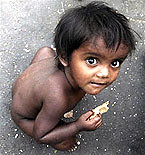With a childhood obesity epidemic, reports of lead in candy and costumes and millions of pumpkins that could have been used for food, it's about time someone took steps to "green Halloween".
Here are some useful tips you can use this Halloween to make your holiday a little greener:
- Use free-trade, organic chocolate and other low-sugar alternatives for treats.
- Recycle decorations and costumes or make both from other recycled items.
- Pick a pumpkin, plant a pumpkin.
- Compost jack-o-lanterns to make soil for other gardening projects.
- Buy pumpkins from local farmers.
- Trick or treat for a cause, such as UNICEF or Treat-for-Trees.
To learn more about these ideas, visit:
- www.GreenHalloweenNYC.org
- www.GreenHalloween.com
Oct 30, 2009
Oct 23, 2009
#147: My Big Green Bucket [List] (Friday, October 23)
One week from now I will be able to cross one of my bucket list items off my list: seeing Stevie Wonder live in concert.
It got me thinking that in addition to my regular bucket list, I should also have some green things I want to do with my life. So I decided to create a green bucket list, a list of eco-friendly things I wanna do at some point in my life.
- Take a cross country road trip (some of which would be accomplished by hiking the Rocky Mountain trail) which would entail a few nights camping at Mount Rushmore.
- Do a volunteer vacation trip either through Habitat for Humanity or Gap Adventures
- Own an eco-friendly house (solar panels, dual flush toilets, rain water tanks, etc.)
- Visit the Amazon, one of the most ecologically-rich places on earth (my current morbid fear of lizards prohibits this, but hopefully with some hypnotherapy I can emerge triumphant over my lizard fear)
What's in your green bucket list?
It got me thinking that in addition to my regular bucket list, I should also have some green things I want to do with my life. So I decided to create a green bucket list, a list of eco-friendly things I wanna do at some point in my life.
- Take a cross country road trip (some of which would be accomplished by hiking the Rocky Mountain trail) which would entail a few nights camping at Mount Rushmore.
- Do a volunteer vacation trip either through Habitat for Humanity or Gap Adventures
- Own an eco-friendly house (solar panels, dual flush toilets, rain water tanks, etc.)
- Visit the Amazon, one of the most ecologically-rich places on earth (my current morbid fear of lizards prohibits this, but hopefully with some hypnotherapy I can emerge triumphant over my lizard fear)
What's in your green bucket list?
Oct 16, 2009
#146: World Food Hunger Day (Friday, October 16)
Today is World Food Hunger Day, one of the causes that I'm very passionate about. Climate change and global warming means that a lot of farmable land now cannot be cultivated, which will affect food supply in the years to come. It is conceivable that in the next century, there may be a food shortage crisis on Earth without steps to reverse the effects of climate change. Maybe it won't happen in your lifetime, or your kids' lifetime, but it will happen.
Yet, in America we waste 14% of our food purchases per year, and the average American family throws out over $600 of fruit per year. Most of the food we waste is due to spoilage; we're buying too much and using too little of it. Consider the following statistics:
- Tonight 1 billion people will go to bed hungry
- 1 out of 6 people are chronically hungry, now
- 1.02 billion people go hungry every day. Of that number, 1/2 are in Asia and the Pacific and 1/4 in Sub-Saharan Africa
- 1 child dies every 6 seconds from malnutrion and related causes
What You Can Do:
- Click here for a list of things you can do today, World Food Hunger Day, to make an impact.
- When eating out, take your leftovers (although, apparently it is illegal to do so in Australia) and eat them another time or give them to a homeless person on the street.
- Don't buy perishable food in bulk.
- If you notice that fruit and other perishable foods are near expiration, share them with others (take them to work, to a local shelter, or give to your neighbors and friends).
- If fruit has already gone bad, take it to a compost heap (most local parks have one); at least your food will be used to create good, rich soil.
Click here for 50 Ways to Never Waste Food Again, a list of useful ways to reuse leftovers and use up food before it goes bad.
No one should have to go hungry.
Yet, in America we waste 14% of our food purchases per year, and the average American family throws out over $600 of fruit per year. Most of the food we waste is due to spoilage; we're buying too much and using too little of it. Consider the following statistics:
- Tonight 1 billion people will go to bed hungry
- 1 out of 6 people are chronically hungry, now
- 1.02 billion people go hungry every day. Of that number, 1/2 are in Asia and the Pacific and 1/4 in Sub-Saharan Africa
- 1 child dies every 6 seconds from malnutrion and related causes
What You Can Do:
- Click here for a list of things you can do today, World Food Hunger Day, to make an impact.
- When eating out, take your leftovers (although, apparently it is illegal to do so in Australia) and eat them another time or give them to a homeless person on the street.
- Don't buy perishable food in bulk.
- If you notice that fruit and other perishable foods are near expiration, share them with others (take them to work, to a local shelter, or give to your neighbors and friends).
- If fruit has already gone bad, take it to a compost heap (most local parks have one); at least your food will be used to create good, rich soil.
Click here for 50 Ways to Never Waste Food Again, a list of useful ways to reuse leftovers and use up food before it goes bad.
No one should have to go hungry.
Oct 9, 2009
#145: What's Your Six-Month Commitment? (Friday, October 9)
After last week's entry, I got a few emails from friends who wanted to do their own six-month commitment, but didn't want to take such "drastic" action. Although my commitment may seem drastic to some, it's something that fits into the lifestyle I want to have for myself, so I'm ok with it.
Whatever you decide to do for your commitment should be equally complementary to your life. It shouldn't be something so difficult or taxing that you're likely to quit after the first month. Yes, it'll be uncomfortable, but doing new things usually are. Here are suggestions that may be easier to implement for a green novice:
Learn about your community. For the next six months, take the time to learn more about where you live. See which businesses are making efforts to be more green and support them. Find the local farmer's markets. Identify charities and other local events (such as community gardens and parks) that could use your volunteerism. Identify green/eco-friendly projects that could improve your community and discuss them with your local council members.
Change a light bulb. Once a month for the next 6 months, change one lightbulb to a greener, energy-saving option.
Boycott a product/service. Identify 1 product or service you currently consume that is bad for the environment and boycott it for the next 6 months. Use that time to research other greener options.
Test drive paper billing. Commit to canceling one of your paper bills (telephone bill, electric, magazine subscription) and viewing it online instead. I promise you you won't go back to the paper.
Subsitute a harsh cleaner for a natural alternative. For the next six months, try using a baking soda/vinegar combination for your cleaning needs. This combo can clean bathrooms and kitchens; unclog drains; remove paint and carpet stains; neutralize odors such as garbage and pet urine.
What's your 6-month commitment? I'd love to know.
Whatever you decide to do for your commitment should be equally complementary to your life. It shouldn't be something so difficult or taxing that you're likely to quit after the first month. Yes, it'll be uncomfortable, but doing new things usually are. Here are suggestions that may be easier to implement for a green novice:
Learn about your community. For the next six months, take the time to learn more about where you live. See which businesses are making efforts to be more green and support them. Find the local farmer's markets. Identify charities and other local events (such as community gardens and parks) that could use your volunteerism. Identify green/eco-friendly projects that could improve your community and discuss them with your local council members.
Change a light bulb. Once a month for the next 6 months, change one lightbulb to a greener, energy-saving option.
Boycott a product/service. Identify 1 product or service you currently consume that is bad for the environment and boycott it for the next 6 months. Use that time to research other greener options.
Test drive paper billing. Commit to canceling one of your paper bills (telephone bill, electric, magazine subscription) and viewing it online instead. I promise you you won't go back to the paper.
Subsitute a harsh cleaner for a natural alternative. For the next six months, try using a baking soda/vinegar combination for your cleaning needs. This combo can clean bathrooms and kitchens; unclog drains; remove paint and carpet stains; neutralize odors such as garbage and pet urine.
What's your 6-month commitment? I'd love to know.
Oct 2, 2009
#144: The Six-Month Commitment (Friday, October 2)
So every year, I choose a different theme for Good Fridays. In 2007, the theme was impacting the lives of others through little deeds. In 2008, the theme was "Enjoy Life", and this year we've gone green. In January I'm going to have another theme, but I also want this green concept to be one that sticks, so I began thinking of something I could do to keep green at the forefront of my daily life after December 31, 2010.
That's how I came up with The Six-Month Commitment. It's choosing a green idea that you will implement now and continue for the next 6 months (which will take you into the new year). We all know that habits are hard to break, so the goal is to form a green habit that you can continue and build on after the 6 months are over.
So my Six-Month Commitment is to green my clothing habits. After today, I am committing that for the next 6 months, I will not buy any new clothing for myself (except 1 suit, if needed for an interview and undergarments). Instead, I'll rely on the clothing and shoes I already have in my closet, and if I need something, I will buy it recycled from a thrift shop. I am also donating clothes I don't need to local shelters and other organizations where those in need don't have to pay to get them.
Of course since I've made that commitment, I've heard about a 7 jeans sale this weekend; I've found out that the Hunter boots I've wanted for a year are available in the color I want--and are on sale; and I just got a 20% off coupon for a bag that I've been dying to get. Go figure.
The holiday season will be hard, especially since I'll be celebrating my birthday at the same time. But I won't lose sight of my goal.
What's your Six-Month Commitment? Choose something today (it could be giving up bottled water, driving one less day per week, joining a co-op; supporting your local farmer's market; taking shorter showers...). Whatever you decide, just make sure it is eco-friendly and you can sustain it for six months.
That's how I came up with The Six-Month Commitment. It's choosing a green idea that you will implement now and continue for the next 6 months (which will take you into the new year). We all know that habits are hard to break, so the goal is to form a green habit that you can continue and build on after the 6 months are over.
So my Six-Month Commitment is to green my clothing habits. After today, I am committing that for the next 6 months, I will not buy any new clothing for myself (except 1 suit, if needed for an interview and undergarments). Instead, I'll rely on the clothing and shoes I already have in my closet, and if I need something, I will buy it recycled from a thrift shop. I am also donating clothes I don't need to local shelters and other organizations where those in need don't have to pay to get them.
Of course since I've made that commitment, I've heard about a 7 jeans sale this weekend; I've found out that the Hunter boots I've wanted for a year are available in the color I want--and are on sale; and I just got a 20% off coupon for a bag that I've been dying to get. Go figure.
The holiday season will be hard, especially since I'll be celebrating my birthday at the same time. But I won't lose sight of my goal.
What's your Six-Month Commitment? Choose something today (it could be giving up bottled water, driving one less day per week, joining a co-op; supporting your local farmer's market; taking shorter showers...). Whatever you decide, just make sure it is eco-friendly and you can sustain it for six months.
Subscribe to:
Posts (Atom)



